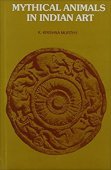Gajanana, Gaja-anana, Gajānāna: 11 definitions
Introduction:
Gajanana means something in Hinduism, Sanskrit, Marathi. If you want to know the exact meaning, history, etymology or English translation of this term then check out the descriptions on this page. Add your comment or reference to a book if you want to contribute to this summary article.
In Hinduism
Purana and Itihasa (epic history)
Source: archive.org: Shiva Purana - English TranslationGajānana (गजानन) refers to an “elephant’s head”, according to the Śivapurāṇa 2.4.13 (“The birth of Gaṇeśa”).—Accordingly, as Brahmā said to Nārada: “Due to the difference of Kalpas, the story of the birth of Gaṇeśa is told in different ways. According to one account he is born of the great lord. His head looked at by Śani was cut off and an elephant’s head (gajānana) was put on him [saṃcitaṃ gajamānanam]. Now we narrate the story of the birth of Gaṇeśa in Śvetakalpa when his head was cut off by the merciful Śiva. [...]”.
Source: Cologne Digital Sanskrit Dictionaries: The Purana IndexGajānāna (गजानान).—Is Gaṇeśa.*
- * Brahmāṇḍa-purāṇa III. 41. 54: 42. 35: 44. 51: IV. 27. 72. Matsya-purāṇa 154. 505.

The Purana (पुराण, purāṇas) refers to Sanskrit literature preserving ancient India’s vast cultural history, including historical legends, religious ceremonies, various arts and sciences. The eighteen mahapuranas total over 400,000 shlokas (metrical couplets) and date to at least several centuries BCE.
Languages of India and abroad
Marathi-English dictionary
Source: DDSA: The Molesworth Marathi and English Dictionarygajānana (गजानन).—m (S Elephant-faced.) A name of gaṇēśa.
Source: DDSA: The Aryabhusan school dictionary, Marathi-Englishgajānana (गजानन).—m A name of gaṇapati.
Marathi is an Indo-European language having over 70 million native speakers people in (predominantly) Maharashtra India. Marathi, like many other Indo-Aryan languages, evolved from early forms of Prakrit, which itself is a subset of Sanskrit, one of the most ancient languages of the world.
Sanskrit dictionary
Source: DDSA: The practical Sanskrit-English dictionaryGajānana (गजानन).—epithets of Ganeśa.
Derivable forms: gajānanaḥ (गजाननः).
Gajānana is a Sanskrit compound consisting of the terms gaja and ānana (आनन). See also (synonyms): gajāsya.
Source: Cologne Digital Sanskrit Dictionaries: Shabda-Sagara Sanskrit-English DictionaryGajānana (गजानन).—m.
(-naḥ) The deity Ganesha. E. gaja an elephant, and ānana a face; see gajavadana.
Source: Cologne Digital Sanskrit Dictionaries: Monier-Williams Sanskrit-English DictionaryGajānana (गजानन):—[from gaja > gaj] m. = ja-mukha, [Gaṇeśa-purāṇa; Siṃhāsana-dvātriṃśikā or vikramāditya-caritra, jaina recension]
Source: Cologne Digital Sanskrit Dictionaries: Yates Sanskrit-English DictionaryGajānana (गजानन):—[gajā+nana] (naḥ) 1. m. Ganesha.
[Sanskrit to German]
Sanskrit, also spelled संस्कृतम् (saṃskṛtam), is an ancient language of India commonly seen as the grandmother of the Indo-European language family (even English!). Closely allied with Prakrit and Pali, Sanskrit is more exhaustive in both grammar and terms and has the most extensive collection of literature in the world, greatly surpassing its sister-languages Greek and Latin.
Kannada-English dictionary
Source: Alar: Kannada-English corpusGajānana (ಗಜಾನನ):—
1) [noun] = ಗಜಮುಖ [gajamukha].
2) [noun] (Jaina) name of one of the hells.
Kannada is a Dravidian language (as opposed to the Indo-European language family) mainly spoken in the southwestern region of India.
See also (Relevant definitions)
Starts with: Gajananamukha.
Ends with: Nirlimgajanana.
Full-text: Gajasya, Ibhanana, Jayavighnamahayantra, Ganapati, Ganesha, Lalitasana, Vinayaka.
Relevant text
Search found 10 books and stories containing Gajanana, Gaja-anana, Gaja-ānana, Gajānāna, Gajānana; (plurals include: Gajananas, ananas, ānanas, Gajānānas, Gajānanas). You can also click to the full overview containing English textual excerpts. Below are direct links for the most relevant articles:
Garga Samhita (English) (by Danavir Goswami)
Verse 6.10.21 < [Chapter 10 - In the Description of the Gomatī River, the Glories of Cakra-tīrtha]
The Skanda Purana (by G. V. Tagare)
Chapter 19 - The Fail of Vīrabhadra < [Section 4 - Kārttikamāsa-māhātmya]
Chapter 12 - The Installation of Gaṇeśa < [Section 2 - Dharmāraṇya-khaṇḍa]
Chapter 18 - Rudra’s Army Defeated < [Section 4 - Kārttikamāsa-māhātmya]
The Padma Purana (by N.A. Deshpande)
Chapter 101 - The Fight Goes On < [Section 6 - Uttara-Khaṇḍa (Concluding Section)]
Chapter 17 - Śukra is Confined by Kṛtyā inside Her Vulva < [Section 6 - Uttara-Khaṇḍa (Concluding Section)]
Chapter 100 - Śiva’s Attendants Fight the Demons off < [Section 6 - Uttara-Khaṇḍa (Concluding Section)]
The Linga Purana (by J. L. Shastri)
Chapter 105 - The origin of Vināyaka < [Section 1 - Uttarabhāga]
The Brahmanda Purana (by G.V. Tagare)
Chapter 42 - The narrative of Bhārgava Paraśurāma (f) < [Section 3 - Upodghāta-pāda]
Bhagavatpadabhyudaya by Lakshmana Suri (study) (by Lathika M. P.)
Cosmology and the powers of Māya < [Chapter 3 - References to Śaṅkara’s Philosophy]
The Subtle Body < [Chapter 3 - References to Śaṅkara’s Philosophy]
Mokṣa or Liberation < [Chapter 3 - References to Śaṅkara’s Philosophy]
Related products
